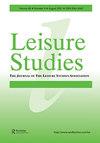Māori households assembling precarious leisure
IF 2.3
2区 社会学
Q2 HOSPITALITY, LEISURE, SPORT & TOURISM
引用次数: 0
Abstract
Many members of the precariat in Aotearoa/New Zealand (NZ) struggle to access resources for leisure. This article draws on four interview waves with five precariat Māori (Indigenous peoples of Aotearoa/NZ) households (N = 32 interviews) using mapping and photo-elicitation interviews to explore participant leisure engagements. We document how precarious leisure for some Māori is assembled agentively by participants out of key elements associated with their situations (e.g. financial and housing insecurities) and core Māori principles and processes of whanaungatanga (cultivating positive relationships) and manaakitanga (caring for self and others). Participant accounts foregrounded the importance of mātauranga Māori (systems of knowledge) and culture in shaping contemporary leisure practices that can promote a sense of ontological security, place, belonging, connection, cultural continuity, and self as Māori. Though beneficial to self and others, participant leisure practices are rendered insecure by the resource restraints of life in the precariat.Māori家庭聚集不稳定的闲暇
新西兰(NZ)的许多不稳定阶级成员努力获得休闲资源。本文通过对5个precariat Māori (Aotearoa/NZ的土著居民)家庭(N = 32次访谈)的四次访谈,使用地图和照片引出访谈来探索参与者的休闲活动。我们记录了一些人Māori的不稳定闲暇是如何由参与者根据与他们的处境相关的关键因素(例如,经济和住房不安全)以及Māori的核心原则和whanaungatanga(培养积极的关系)和manaakitanga(照顾自己和他人)的过程来进行的。参与者的叙述强调了mātauranga Māori(知识系统)和文化在塑造当代休闲实践中的重要性,这些实践可以促进本体论安全感、地方感、归属感、联系感、文化连续性和Māori自我感。尽管对自己和他人都有益,但参与者的休闲活动由于不稳定阶层生活的资源限制而变得不安全。
本文章由计算机程序翻译,如有差异,请以英文原文为准。
求助全文
约1分钟内获得全文
求助全文
来源期刊

Leisure Studies
HOSPITALITY, LEISURE, SPORT & TOURISM-
CiteScore
4.90
自引率
14.30%
发文量
85
期刊介绍:
Leisure Studies publishes articles of a high standard on all aspects of leisure studies and from a variety of disciplinary bases, including sociology, psychology, human geography, planning, economics, etc. Shorter research notes and book reviews are also published. The emphasis of the Journal is on the social sciences, broadly defined, and the subjects covered include the whole range of leisure behaviour in the arts, sports, cultural and informal activities, tourism, urban and rural recreation.
 求助内容:
求助内容: 应助结果提醒方式:
应助结果提醒方式:


